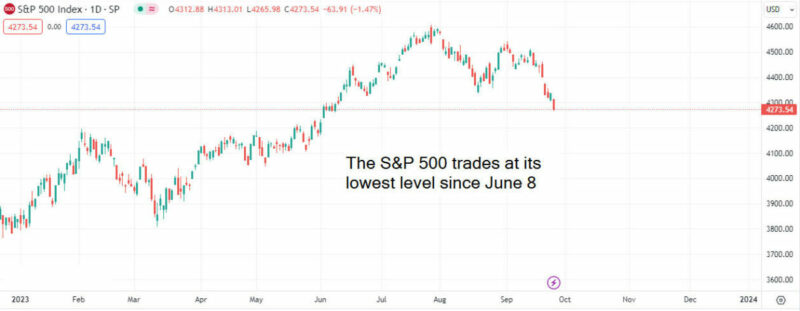Shares on Wall Street continue to be under pressure, as worries over interest rates staying higher for longer kept the 10-year Treasury yield buoyant, with investors looking toward the next round of quarterly results as earnings season gets underway. The Federal Reserve kept interest rates unchanged at 5.25%-5.50% last Wednesday but warned that we could potentially see one more rate hike this year, while Chair Jerome Powell said that the rate-hiking cycle will probably last longer than many on Wall Street want. Robert Pavlik, senior portfolio manager at Dakota Wealth, said:
“Historically, an extended period of tight monetary policy has almost always led to an economic contraction. Because of this, there’s a lack of conviction or willingness for buyers to step up and support stock prices at these levels, even though there may be representative bargains out there. “

Higher rates encourage saving over spending and make the debt more costly, and companies that have a bigger credit or other loans with variable interest rates could be in a difficult situation. Higher borrowing costs can hurt corporate profits and discourage businesses from borrowing to invest in new projects, which can hurt economic activity and job creation. Corporate profits are emerging as the big driver of what the market is likely to do in the near term, but if earnings results fall short of expectations, the stock market’s reaction could be severe.
According to LSEG IBES data that was released last Friday, third-quarter earnings for S&P 500 companies are currently estimated by analysts to increase just 1.5% year-over-year, which is slightly down from a week ago, when analysts were estimating a 1.9% year-over-year increase. Micron Technology, Nike, PepsiCo, Delta Air Lines, BlackRock, Citigroup, JPMorgan Chase, Johnson & Johnson, United Health Group, Goldman Sachs, Bank of America, and Wells Fargo are among the companies scheduled to report quarterly results by October 17. A negative financial performance among these companies could lower shares on Wall Street even more, and investors will watch guidance carefully from these companies to determine if profit margins remain healthy and strong.
American Association of Individual Investors (AAII) Sentiment Survey reported last week that bearish sentiment, or expectations that stock prices will fall over the next six months, gained 5.4 percentage points to 34.6%. Pessimism is above its historical average of 31.0% for the third time in five weeks, and investors should keep in mind that stocks aren’t the only assets that could significantly lose their value. Cryptocurrencies could also be in the situation to make an even bigger fall, especially if Bitcoin continues to maintain a downside trajectory. There are expectations of “market turbulence” from looming recession concerns and macro uncertainty, and the upside potential for stocks and cryptocurrencies probably remains limited for the weeks ahead.



